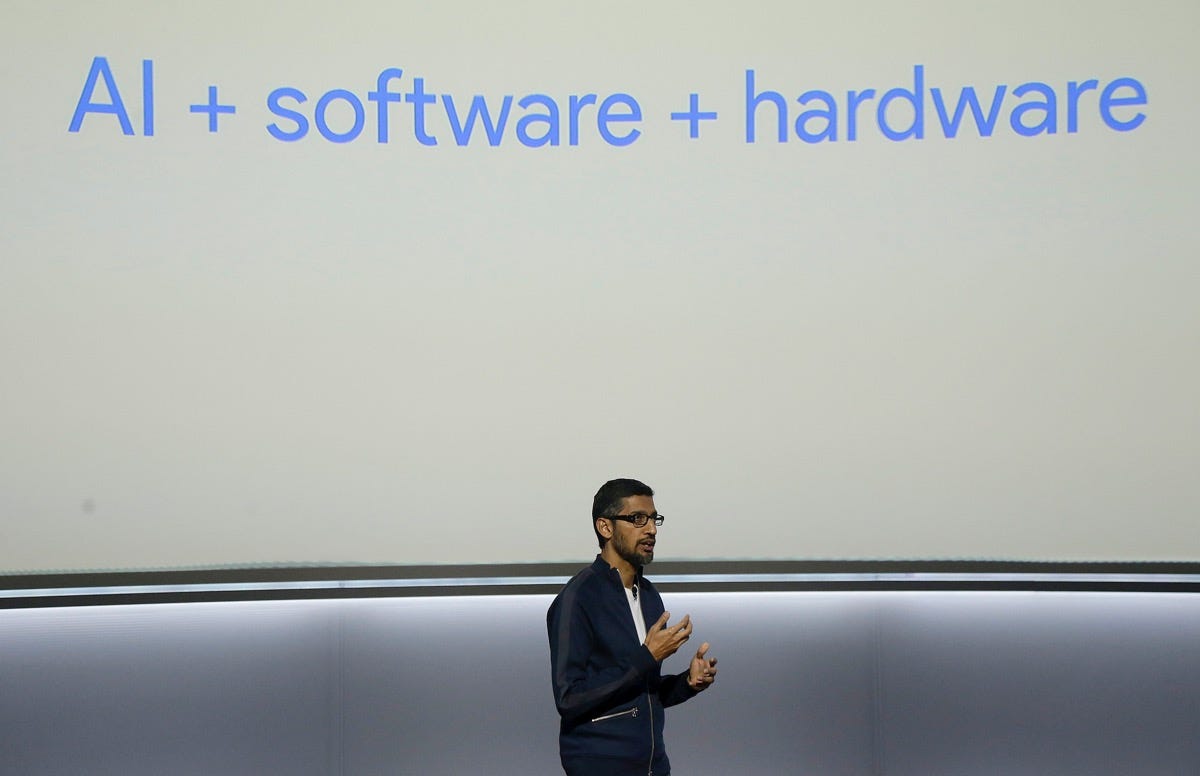- Aug 2, 2015
- 4,286

- Google is taking hardware seriously after years of experimentation.
- But it doesn't have a chance at becoming another Apple or Samsung.
- Instead, Google's hardware division will be used to sneak the company's AI technology into everything else.
Suddenly, Google is starting to look like a hardware company.
As the holiday gadget-buying season approaches, Google's offerings are starting to look more like what you'd see from Samsung or Apple, not a search giant.
It started this week with the launch of the new Pixel 2 phones, which, despite their ugly designs and iffy screens, got largely positive reviews. Next come a slew of new gadgets — wireless earbuds, an attractive Chromebook, jumbo and mini versions of its Google Home smart speaker, a GoPro-like camera, and a refined version of its virtual-reality headset.
Google has dabbled with hardware in the past without much success, but the company now appears to be serious about turning it into a real business. Last year, the company put Rick Osterloh, the former president of mobile-phone maker Motorola, in charge of its hardware efforts. More recently, it spent more than $1 billion to bulk up its capabilities by acquiring portions of HTC's phone business.
At first glance, hardware seems like a sideshow for Google
If Google now seems more serious about hardware, it hasn't exactly explained why it is. Almost all of its revenues still come from advertising. The high-end phone market, in which its new Pixel smartphones will compete, is already saturated, giving Google little hope it can break through.
Even if it spurs broad consumer interest in the devices, Google's track record for meeting demand hasn't been good. Last year it had a dreadful time making enough of its original Pixel phones. By some estimates, the company sold little more than 1 million of them. On average, Apple sells a million iPhones every few days.
In terms of its potential impact on Google's overall sales, the company's hardware effort doesn't look as if it will ever be anything more than a small sideshow to its core search business.
But that doesn't mean it's unimportant.
Google sees AI as its next Android
Google hinted at why it's putting so much effort into hardware at its press event earlier this month when it introduced the new Pixels and showed off its other upcoming products. The underlying theme of that event was Google Assistant, the company's voice-assistant technology that competes with Amazon's Alexa and Apple's Siri.
Google clearly sees Assistant — and AI more generally — as its next big foundational technology, one that could soon rank up there with its search technology and Android. And reading between the lines of the press event, it seems clear that Google sees its hardware effort as a kind of Trojan Horse for its AI efforts, a way to sneak its assistant and its AI into consumers' homes and lives.
For all the talk in the tech industry about the new computing devices that could replace the smartphone, such as augmented-reality goggles and smartwatches, the software underlying those devices will likely be more important than the gadgets themselves. Because it's the intelligence underlying those devices that will truly make them sing. And among the major tech players, Google is in the best position possible to power these next-generation devices, because its artificial intelligence and related "smarts" are the best in the world.
Google Assistant is only about a year old, but it's already proving itself more capable than older rivals, such as Siri, Alexa, and Microsoft's Cortana. Google's advantage is that Assistant can draw on the wealth of information the company has gleaned about you from your search history, Gmail account, and more, and that Assistant can stitch all that information together better than any of its competitors.
Google is stuffing its hardware with AI
Google's key challenge is to get Assistant and its related AI technologies inside more devices and into the hands of more consumers. Its new hardware products indicate how it plans to do just that.
All of Google's new products incorporate its AI technologies in one way or another. For example, Google Clips, its new camera, uses AI to monitor what's happening around it to determine the best time to take short video clips. It then transfers those clips to Google Photos, the company's photo-storage service, which offers image recognition that's constantly improving thanks to machine learning.
Google's also stuffed its AI into its new Pixel Buds, its wireless earbuds that can translate languages in real time, like something you'd see on "Star Trek." And it's built Assistant into many of its other new products, including the Pixel 2 phones, its new Home speakers, and its Pixelbook laptop.
The search giant is using its hardware to spur other device makers to use its AI
Now that the company has added AI into its own hardware products, its challenge is to persuade its hardware partners to adopt its AI technology too, as they did Android last decade. But that's where Google's hardware comes into play.
Google's devices serve as benchmarks for manufacturers who build devices that rely on Android and the search giant's other platforms. Assuming that's the case here, there likely soon will be lots of other products that include Google's AI technologies.
You can already see this starting to play out. Regardless of the manufacturer, all new Android phones ship with Assistant. Manufacturers including Sony, Panasonic, and soon Sonos are building Assistant into their smart speakers.
Google's AI is even making its way into more mundane devices. For instance, LG announced earlier this year that you'll soon be able to control its washing machines and robot vacuums via Assistant ("OK, Google, vacuum my living room"). Down the road, the integration of AI into such everyday gadgets and appliances could offer the biggest opportunity for the technology.
By using its hardware to sneak its AI into your life, Google is positioning itself to lead that revolution.

